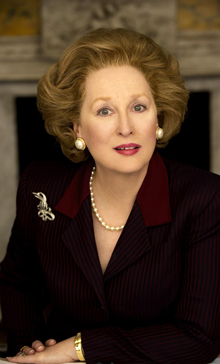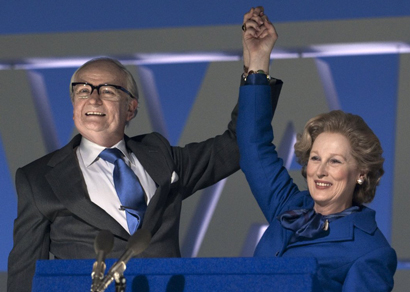
 |
|
|
|
One of the 'gotta-see' movies of last year's OCC (Oscar Chase Crop) was Phyllida Lloyd's The Iron Lady. Although it's quite well directed, the talented woman behind the camera received relatively little publicity in the Oscars media onslaught. Celebrated actress Meryl Streep gave such an arresting performance that a publicist was hardly needed to convince the world that hers was the best demonstration of acting for 2011. And the character she plays is an entirely un-glamorous dotty old woman drifting in and out of senile dementia. 
The movie finds the retired Prime Minister Margaret Thatcher (Streep) in decline. Ruminating over her life, she becomes so absorbed in her memories that her middle-aged daughter and various minder/protectors conclude that her mind is drifting in and out of touch. When asked political questions, "Maggie" formulates elaborate, articulate answers as if she were still Prime Minister. Yet the august lady is a little disengaged upstairs: she's been carrying on private conversations with her deceased husband Denis (Jim Broadbent) as if he's still there. Ms. Thatcher remembers growing up as a grocer's daughter, attending Oxford and facing resistance when she entered politics. According to this version of events, the star of the Conservative Party became Prime Minister to lead the nation out of an economic crisis. Her tough austerity measures were so unpopular that they provoked riots, and her hard-line position against the I.R.A. was answered with terrorist violence. Things turned around for the Conservatives when Argentina seized the Falklands Islands. Thatcher went to war and won a swift but costly victory. Then the economy rebounded, vindicating her policies. Only later was Thatcher pushed out of politics, when her intransigent attitude alienated her own party. She was the longest-serving Prime Minister of the 20th century. The Iron Lady contains the most successful makeup work in a movie in recent memory. We cannot tell where the prosthetics leave off and Streep's performance begins. Thatcher always looked formidable, with every hair of her iconic hairdo in place. I can imagine Streep and her technicians working for weeks to get just the right artificial teeth for the impersonation. The accomplishment here comes into focus when compared to last year's other ode to a conservative hero, Eastwood's J. Edgar. Leonardo DiCaprio looks at times as if somebody pasted Silly Putty onto his face. We can't tell what we're looking at, but it doesn't resemble Hoover; it looks more like old-man Charles Foster Kane in the larval state. Maybe it's Streep's acting doing the selling, but we never think to look for flaws in her makeup job -- it's just there. Old Maggie's skin is so convincing we can practically smell the face powder. The wattles and the shape-shifting masses never betray their source as latex appliances. The Iron Lady is a somewhat disturbing take on the Thatcher years. A differing viewpoint (I'm not saying the correct one) would claim that she 'rescued' Britain by placing the burden of the economy on the poor and breaking the Unions as had Ronald Reagan, only twice as vicious. Her plan is the same being sold in America today: the privatizing of public property and institutions. Thatcher made little distinction between public policy and the needs of big business. Any citizen not contributing to her nation-as-factory is an undeserving slacker. Her 'business as usual' remark became a rallying cry for critics -- business as usual meant giving big business the right to steamroll anything in its way. Thatcher certainly had the courage of her convictions. The script presents her as the hero in a western, a decisive leader surrounded by lesser mortals staying quiet in their government jobs and playing safe. Her Conservative Party colleagues are by and large a bunch of snobs incapable of leading by consensus. Thatcher re-invents herself as a strong leader, as seen in a grand The King's Speech moment: the camera swoops in circles as a vocal coach helps her develop a more commanding voice. Gee, had the great lady enjoyed Ronald Reagan's training as a Warners contract player, she would have learned how to project authority and shout down dissent in all situations. Director Lloyd shows the proud Minister striding down a long hallway, sometimes alone and at other times nobly leading a band of followers, as in The Right Stuff. They mean well, but only Maggie carries the sword Excalibur. And she is a fighter. The film stresses I.R.A. bomb attacks on her government, her best friends and even she and Denis. Embattled on all sides, she addresses her peers as if she were a War Minister. Like any fearless leader, Thatcher has a 'sidekick' minister friend who falls victim to a terror bombing, only a few feet away from her. This means war! Of course, there's no effective way to fight back against the I.R.A.: if you want to see a dissenting image of Britain's 'economic recovery' of those days battling the Irish, see the allegorical crime film The Long Good Friday. It equates Thatcher's privatization-developers of Great Britain with Cockney gangsters. 
An Argentine junta eventually gives Thatcher exactly what she needs to neutralize the opposition -- a real war, or at least a fierce combat against a foe capable of fighting back. A better political gift for the embattled Prime Minister would be difficult to imagine. Rallying around the flag and "This Island Fortress" sentiments takes the heat off of the domestic economic disaster, even as the country spends enormous sums in the fight. The Iron Lady shows Thatcher comparing the Falklands to Pearl Harbor, a bogus analogy that sounds like something heard in this year's Presidential campaigns. The little islands are only a point of pride and bragging rights, a way of saying, "We lost India and we lost Africa but here's where we draw the line." With a victory to silence the dissenters (they're unpatriotic, you know) the economy forges ahead, and a montage shows England's business community recovering. It also implies that Thatcher's stubborn nature has something to do with the fall of the Berlin Wall. The Iron Lady then tempers its portrait by showing Thatcher behaving abominably toward her fellow conservatives, bullying and chastising them over petty points. She has lost her sense of perspective and is shocked when her own party dumps her. The movie's Maggie considers herself to be some kind of leader in perpetuity. She is uncomprehending when she's cast out after all her successes. NOW, I've read a couple of articles expressing concern that The Iron Lady and J. Edgar represent a new conservative propaganda onslaught. Well maybe, but after the Oliver Stone years I've been waiting for a long time for the inevitable conservative backlash by competent filmmakers. People lamenting that the biased The Iron Lady will become the official version of the 1980s in England need to be reminded that the irksome, influential JFK has forever buried any rational approach to the Kennedy assassination controversy under a barrage of fictitious conjecture. Was it Donald Sutherland who killed JFK, or was it John Candy? I forget. Take Ralph Nader. A successful liberal film might tout the maverick consumer advocate's battle against the auto industry, and his later protest politics against the no-choice two party political system. A blockbuster conservative film might contrastingly characterize Nader as a weirdo gadfly making himself famous by scaring the public against good American products, and then fomenting liberal confusion and disarray by splitting the vote in the Bush-Gore election. Movie biographies always seem too selective about their facts and too eager to fictionalize; don't be shocked when more conservative examples begin to arrive after the success of The Iron Lady. The Left definitely considers both Thatcher and Hoover to be historical villains, and both are given sensitive, understanding consideration on screen. In Margaret Thatcher's case we are also encouraged to consider her feelings as a proud and dignified grand lady in her decline. The supposedly addled 'Maggie' can still assert herself in a clinch. A doctor tries to assess the state of her mental deterioration, and finds that she's sharper than a tack. Thatcher is lucky that it's a male doctor, which automatically puts her on her guard. The movie is also an interesting study of a wealthy national celebrity (and a Baroness, no less) slipping into old age. While not quite as focused as the remarkable Away from Her it shows how those around Thatcher can't help but be concerned that she's slowly losing her marbles. Margaret's visions of Denis still trading jokes and conversation with her are seen more as a personal self-indulgence than a sickness. At one point, realizing that she's picked up a bad habit, she tries to drown out Denis's voice by starting all the noise-making appliances she can turn on. The moment brings back memories of Angie Dickinson's protest against Lee Marvin in Point Blank. Hm, why does this film keep reminding me of classic crime stories? Will Maggie come to her senses, pack up all of Denis's clothes and let him go? The phantom Denis serves as a convenient narrative crutch to spur Maggie's memories of marriage proposals and dancing to Oscar & Hammerstein, but his presence also keeps us from growing weary of her. The Iron Lady makes Margaret Thatcher affectionate and sentimental, which is quite an accomplishment. 
There may be a little dissenting kickback in the film itself. While campaigning, Margaret dishes out soft-serve ice cream to some local voters. She talks to an excited citizen, saying, "My husband Denis prefers something icy on a stick." That's our gal. Anchor Bay and The Weinstein Company's Blu-ray - DVD and Digital Copy presentation of The Iron Lady is the expected flawless HD encoding of this interestingly tilted political biography. The standard sized keep case contains three separate discs. Thomas Newman's music score contributes mightily to the film's swiftly changing tone. Most of the major historical events are covered in brief montages, and the music is needed to graft together jingoistic martial moods with Ms. Thatcher's personal drama in her quiet rooms. If The King's Speech hadn't hit the year before this film might have made a stronger Oscar showing. The Academy seems to Vote Limey every few years or so (anybody even remember The Queen?), but rarely two years in a row. The presentation has no commentary or analytical extras, just a selection of EPK-promotional featurettes that don't address the content of the show. Once again we're impressed by The Weinstein Company's ability to pick and nurture classy prestige films for its yearly slate. They're clearly doing something right -- they score Oscar nominations at a higher rate than big studios that put out many more releases per year.
On a scale of Excellent, Good, Fair, and Poor,
The Iron Lady Blu-ray rates:
Reviews on the Savant main site have additional credits information and are often updated and annotated with reader input and graphics. Also, don't forget the 2011 Savant Wish List. T'was Ever Thus.
Review Staff | About DVD Talk | Newsletter Subscribe | Join DVD Talk Forum |
| ||||||||||||||||||